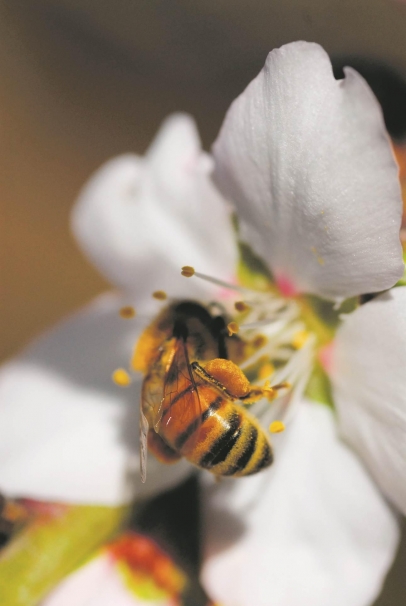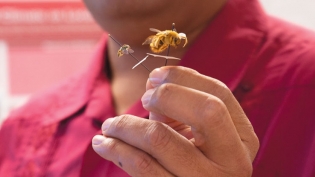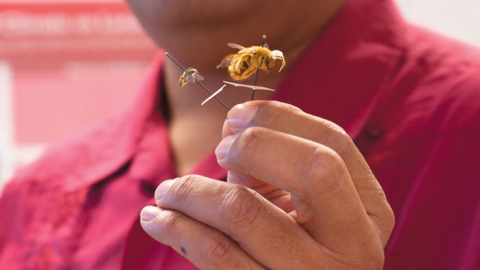Healthy Hives
CSUCI biologist Rubén Alarcón, PhD, is working on a project with Camarillo beekeeper Wayne Scott. Together they are looking into why his bees are doing so well compared to the average keeper’s hives.
“Wayne approached me after learning about the 30 to 40% mortality rate being experienced by the beekeeping industry,” says Alarcón. “He wanted to find out why his hive mortality rates were so much lower. One thing I saw working in his favor was that he is able to personally attend to each of his hives.”
Scott, who has around 1,000 hives scattered around Ventura County ranches, is an independent beekeeper working on genetics and diet. He describes his focus as keeping his bees alive and healthy. Scott was astounded at the high mortality rates, because his colonies have only suffered an average of 3% mortality, with 5% being the high end.
“Ruben and I hope to prove or disapprove some of the theories we have by working together at the university,” says Scott. Diet was the first thing Scott mentioned that he does differently than larger breeders. “By eliminating high-fructose corn syrup and all soy products, the bees seemed to thrive and do better,” he says, adding, “This is just what we’ve found, but a heavy diet of those things is not healthy for a person either. Unfortunately, corn syrup and soy are pretty much the standard right now in the industry.”
“If your bees have a good diet they won’t be as susceptible to infections and mites,” says Scott, who inspects the hives regularly.
He added, “There are just a lot of conditions that didn’t exist 20 years ago—mites, different viruses, different pesticides, losing forage. It’s tougher on the bees, just like the citrus industry dealing with the Asian citrus psyllid.”
Unhealthy hives are treated for mites or disease and it is standard practice for ranchers to have a pesticide notification system in place to alert beekeepers three or four weeks ahead of any planned spraying, so they can move the hives out of the fields or orchards to be sprayed and then return them at a safe reentry date.
Scott also practices forensics on all failed hives to find out what caused their demise. He hopes that together academia and beekeepers can find some answers to the perils facing all bees.
“With the scientific abilities the university has we’re hoping they can help us as beekeepers verify what we’re doing and help point us in the right direction,” Scott says.







